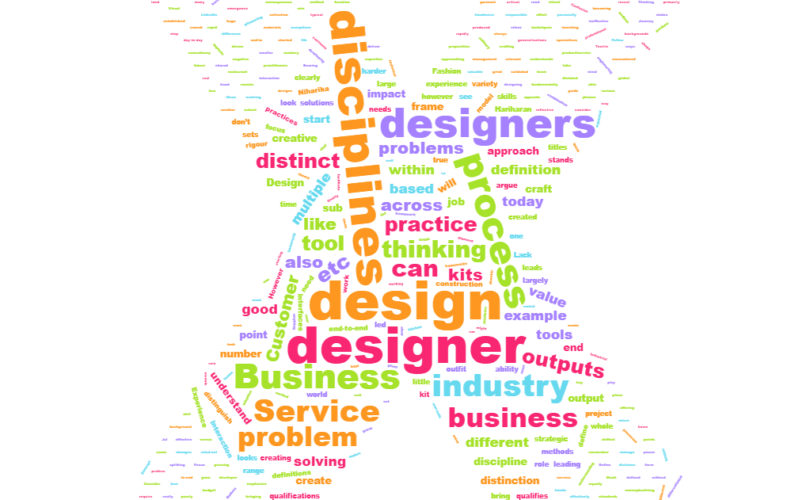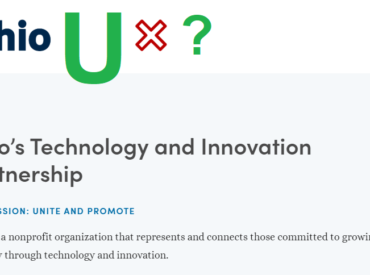(Figure above: a word cloud of the text of Niharika’s article, in the shape of an X.)
Niharika Hariharan, Associate Partner of Design at McKinsey & Company, published an article titled “Why we need to rethink our design disciplines” last week. (The original title was apparently “Siloed design disciplines – less effective problem solving” but I guess she reframed it slightly.) The problems she discusses:
- A Business designer, Service designer, User Experience designer, and other types of strategic designers use similar processes and tools
- There is a wide range of qualifications for people serving in these roles
- Too many hand-offs between designers is inefficient and lowers the quality of work
I agree with her assessment, and others have said similar things over the years. How to make “the rethinking” happen as fields of study, a profession, on teams, in processes, and as an industry. that’s the hard part.
A little history
A few things off the top of my head from the history of discussions around emerging disciplines related to design, technology, and business value (and the desire to define them less chaotically):
- This was before my time, but in 1979, Design as a discipline seems to have kicked off the goal to “establish the theoretical bases for treating Design as a coherent discipline of study in its own right.”
- Designing Business: Multiple Media, Multiple Disciplines (1996) was the first book I read on the subject. Back then, pre-web, it was: Identity design, Information design, and Interactivity design.
- In the 2000s, I was part of a group of people who tried to get the professional associations for HCI, usability, information architecture, technical communication, graphic design, interaction design, and others, to collaborate.
- More recently, Dirk Knemeyer gave us top-down and bottom-up approaches for bringing design thinking and user experience together.
- Enterprise design, in the form of a book and a series of conferences (such as one in 2018) called Intersection, provides a framework for understanding these relationships. For example, mapping design spaces to each other and to the frames.
- My favorite book about design teams is Org Design for Design Orgs.
- Even though Niharika excludes “established and craft based disciplines” from her discussion, their evolution is part of the picture as well. For example, graphic designers were transitioning to experience design in 1998 and mapping professions in 2000. Industrial designers are part of multi-disciplinary teams that include UX designers, too, and they are organizing their own conference about blurring siloed disciplines.
This is a small sample, far from a complete history or a comprehensive listing of all of the places where “discipline rethinking” in the digital age has been happening.
Questions to ponder
Based on years of conversations with people about this, I have found it useful to break things down into several concepts:
- field of study – a branch of knowledge, what you might get a higher education degree in
- profession – an occupation or career, especially one that requires formal training
- community of practice – a group of people who share a passion for something they do and learn how to do it better in social settings
- skill set – a collection of abilities that can be applied to a professional or creative endeavor
- team – a group organized for work
- methodology – a body of processes and rules used by a discipline
- industry – a collection of business establishments used to analyze economic activity
These perspectives are related to each other. A community of practice could evolve into a profession. A field of study can correspond one-to-one to a profession. But not always. A single college degree might prepare you for a number of different careers. Something might be a skill set that can be applied broadly by many professions, yet there are experts who do it as their career. It’s complicated.
One thing I like about Niharika’s article is that she did not try to “name the damn thing.” For now, let’s just call this new unsiloed-discipline-thing “X” and ask some questions about the nature of “X.”
- What does it mean to say that X is a field of study? Would X be a single field of study or would X represent a collection of different branches of knowledge?
- Would studying X be similar to how we learn about math, art, biology, automotive repair, popular culture, or marriage?
- Would people be introduced to X in primary school, get an undergraduate degree in X, or apply for grants to research X?
- What does it mean to say that X is a profession? Would X be a single profession or a family of related professions?
- Would X be a regulated profession, like medical doctors and lawyers?
- Would X be the whole profession, or a role within a broader profession? Would X be a common job title?
- Where would you place X as an occupation in the current US classification system?
- Is the less formal community of practice a more accurate term for X?
- Is X a skill set that applies to many professions?
- What does it mean to say that X is a team within an organization? How is team X related to other teams (such as a marketing team or an operations team) within the organization?
- What does it mean to say that X is a methodology? What makes the X process special or different? Is that “human-centered”?
- What does it mean to say that X is an industry? Is X a “vertical” industry like manufacturing, retail, healthcare, or food service?
- Where would you place X in the current classification of industries (for the USA)? If you were a company that provided X services, then what category would you want to be listed under?
Useful?
Do any of these questions help you think about how we want to rethink this? I do not want to get too meta, but change like this is hard, and thinking in terms of fields of study, professions, methodologies, teams, industries, and more, may help us tease apart the pieces and put them together in actionable ways.
Send me feedback via email or on Twitter. Comment on my LinkedIn summary.
One conference where professional-level change is being planned is Joint Futures. But there is lots to do!


